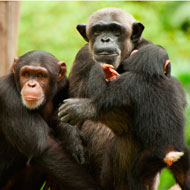Majority of world's primates face extinction

Non-human primates are our closest biological relatives and offer unique insights into human biology and behaviour.
Conservationists are calling on businesses, academics, NGOs and government agencies to pull together to help save primates from extinction.
Writing in the journal Science Advances, researchers say that 60 per cent of primate species face extinction, and 75 per cent have declining populations.
Primates are important to cultures, livelihoods and religions of many societies. They also have a huge part to play in the regeneration of forests and the health of the ecosystem.
But researchers say that solutions can be found if NGO’s, businesses, organisations, academics and the public rally together.
“This is a dire situation. We must prevent the mass extinction of our closest biological relatives. And it is possible,” said study author Professor Jo Setchell from Durham University.
“If we can reduce the unsustainable pressures we are putting on primates and their habitats, and make this a global priority, we can stop this downward spiral towards the destruction of these irreplaceable and fascinating species.
“I can’t imagine a world without other primates, but if we don’t act soon, we will soon be faced with one.”
Non-human primates like apes, lemurs and monkeys are our closest biological relatives and offer unique insights into human biology, evolution, behaviour and the threat of emerging diseases.
Researchers say their decline is a result of human practices, such as industrial agriculture, logging, oil, gas drilling and new road networks for resource extraction.
Professor Setchell added that the situation will only get worse unless we take immediate action.
“Most primates live in regions with high levels of human poverty and inequality, so we need to take immediate action to improve health and access to education, develop sustainable land-use initiatives, and preserve traditional livelihoods that can contribute to food security and environmental conservation,” she said.
“If we continue to degrade habitats to the point where they are unsuitable for our primate relatives, these habitats will eventually become unsuitable for us too.”
In light of the findings, the University of Durham is urging people to avoid buying tropical timber of food products containing palm oil, as both destroy tropical forest.
The University also urges people not to keep wild animals as pets, and to support efforts to tackle global poverty so that people do not need to rely on hunting primates for food.



 The Animal and Plant Health Agency (APHA) has updated its online reporting service for dead wild birds.
The Animal and Plant Health Agency (APHA) has updated its online reporting service for dead wild birds.